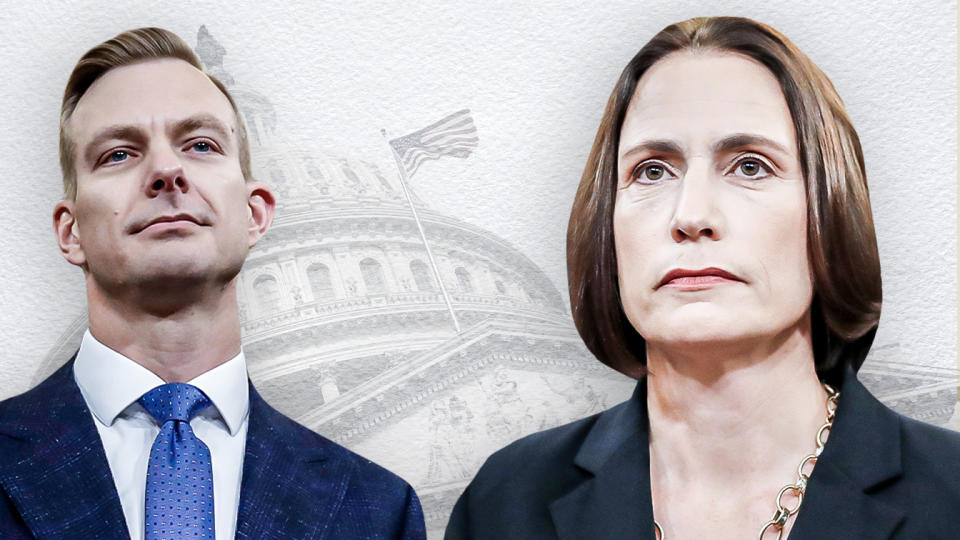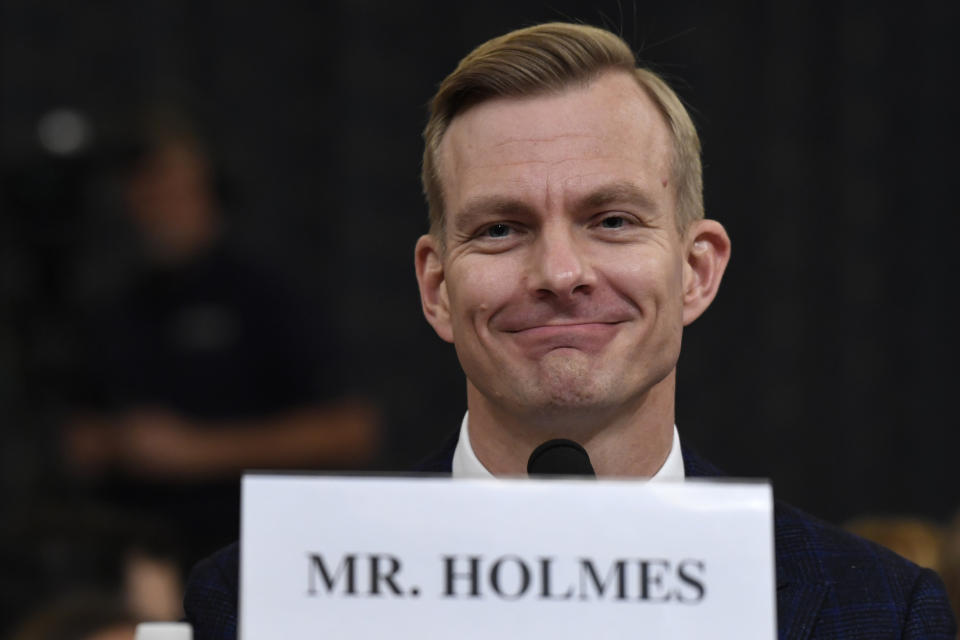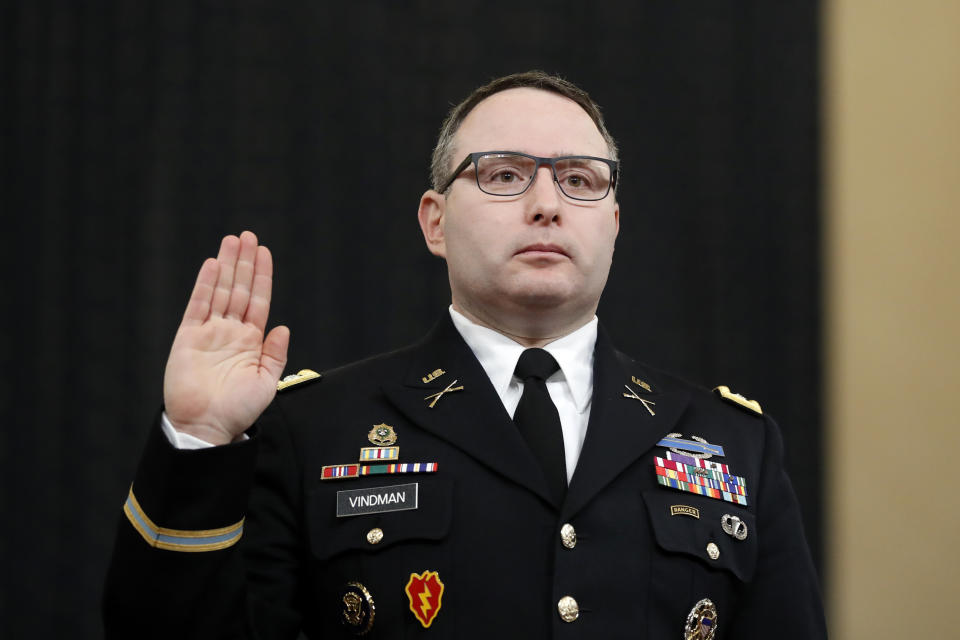Trump impeachment hearings: 5 takeaways from Day 5 of public testimony
The fifth day of public impeachment hearings saw Fiona Hill, who served as the White House’s expert on Russia, undercut claims from Republicans that Ukraine interfered in the 2016 election. It also featured testimony from David Holmes, a U.S. Embassy staffer in Kyiv who overheard a conversation where President Trump asked about the investigation into Joe Biden the day after a pivotal phone call with Ukrainian President Volodymyr Zelensky.
Here are five key takeaways from Thursday’s hearing.
Ukraine interference a “fictional narrative”

Throughout the impeachment hearings, Republicans have attempted to push the idea that Ukraine attempted to interfere in the 2016 presidential election to help Hillary Clinton, thus warranting the White House’s skepticism toward the country, including holding up military aid approved by Congress. Republicans have pointed to an anti-Trump op-ed in The Hill by the Ukrainian ambassador to the United States in August 2016. Trump and his allies have also pushed a debunked conspiracy theory that a Democratic National Committee email server supposedly hidden in Ukraine would prove it was that country that actually hacked the DNC, despite multiple investigations finding Russia to be the perpetrator.
Fiona Hill, who worked under former national security adviser John Bolton, called the Ukraine interference theory a “fictional narrative.”
“Based on questions and statements I have heard, some of you on this committee appear to believe that Russia and its security services did not conduct a campaign against our country — and that perhaps, somehow, for some reason, Ukraine did,” said Hill. “This is a fictional narrative that has been perpetrated and propagated by the Russian security services themselves.
“The unfortunate truth is that Russia was the foreign power that systematically attacked our democratic institutions in 2016,” continued Hill. “This is the public conclusion of our intelligence agencies, confirmed in bipartisan congressional reports. It is beyond dispute, even if some of the underlying details must remain classified.”
Later in the hearing, Hill noted that officials from a number of countries had criticized Trump, believing he would lose, but he hadn’t punished them in the same way.
“There’s a whole host of ambassadors from allied countries who tweeted out or had public comments about the president as well,” Hill said. “And it did not affect security assistance, having meetings with them. If it would, there’d been a lot of people he wouldn’t have met.”
As the hearing wore on, some Republicans on the panel simply stopped asking Hill questions. After Rep. Brad Wenstrup, R-Ohio, spoke, Hill asked if she could talk. Despite Wenstrup’s protests, House Intelligence Committee Chairman Adam Schiff, D-Calif., permitted Hill to speak. She then stated that it was important to push back against Russian interference to avoid a repeat of 2016 and noted the importance of public service.
“All of us who came here under a legal obligation also felt we had a moral obligation to do so,” she said. “We came here as fact witnesses.”
“So, he’s gonna do the investigation?”

David Holmes recounted a lunch with Gordon Sondland, U.S. ambassador to the European Union, whom he overheard when the diplomat spoke to Trump over the phone. The conversation occurred on July 26, one day after the call between Trump and Zelensky — the same call that sparked the whistleblower complaint and later the Democrats’ formal impeachment inquiry.
“I heard President Trump then clarify that Ambassador Sondland was in Ukraine,” said Holmes, who said he could hear the conversation clearly because Trump was speaking loudly. “Ambassador Sondland replied, yes, he was in Ukraine, and went on to state that President Zelensky ‘loves your ass.’ I then heard President Trump ask, ‘So, he’s gonna do the investigation?’ Ambassador Sondland replied that ‘he’s gonna do it,’ adding that President Zelensky will do ‘anything you ask him to.’”
Holmes added that he asked Sondland for his “candid impression” about how Trump felt about Ukraine.
“In particular, I asked Ambassador Sondland if it was true that the president did not give an expletive about Ukraine,” said Holmes. “Ambassador Sondland agreed that the president did not give an expletive about Ukraine. I asked, ‘Why not?’ Ambassador Sondland stated that the president only cares about big stuff. I noted there was big stuff going on in Ukraine, like a war with Russia. Ambassador Sondland replied that he meant big stuff that benefits the president, like the Biden investigation that Mr. [Rudy] Giuliani was pushing.”
The conversation was originally mentioned by diplomat Bill Taylor, who testified last week about an embassy staffer overhearing the conversation.
Trump disputed that Holmes could have heard the call — which, following Taylor’s testimony last week, he denied happened — writing on Twitter, “I have been watching people making phone calls my entire life. My hearing is, and has been, great. Never have I been watching a person making a call, which was not on speakerphone, and been able to hear or understand a conversation. I’ve even tried, but to no avail. Try it live!”
“‘I think this is all going to blow up.’ And here we are.”

Discussing her “testy encounters” with Sondland over the summer, Hill said she realized that instead of one team working together, U.S. outreach to Ukraine was split between the national security team and Trump’s push for investigations.
“One of those [encounters] was in June 18, when I actually said to him, ‘Who put you in charge of Ukraine?’” recalled Hill. “And I mean, I’ll admit I was a bit rude. And that’s when he told me the president. And that shut me up. And this other meeting was about 15, 20 minutes, exactly as he depicted it was. I was actually, to be honest, I was angry with him. And, you know, I hate to say it. But often when women show anger, it’s not fully appreciated. It’s often, you know, pushed on to emotional issues or perhaps deflected onto other people.
“And what I was angry about was that he wasn’t coordinating with us. I now actually realize, having listened to his deposition, that he was absolutely right. That he wasn’t coordinating with us because we weren’t doing the same thing that he was doing,” said Hill, adding that Sondland “was being involved in a domestic political errand. And we were being involved in national security, foreign policy. And those two things had just diverged.”
She continued: “And I did say to him, ‘Ambassador Sondland, Gordon, I think this is all going to blow up.’ And here we are.”
Hill added that she found it unlikely Sondland took so long to realize that an investigation into Burisma, the Ukrainian natural gas company that placed Biden’s son Hunter on its board, actually meant an investigation into the Bidens. Hill also confirmed that the removal of Marie Yovanovitch, a career diplomat, from her post as U.S. ambassador to Ukraine increased the influence of Sondland, a businessman who got his post after donating $1 million to the Trump inauguration.
“They wouldn’t have drawn that conclusion”

Holmes corroborated testimony from Sondland that the White House was pressuring a quid pro quo with Ukraine. While Sondland said the announcement of an investigation into the Bidens was necessary for a White House meeting that Zelensky sought, Holmes said it was also tied to military aid, whose importance he stressed in a message to Secretary of State Mike Pompeo.
“By this point,” recalled Holmes, “my clear impression was that the security assistance hold was likely intended by the president either as an expression of dissatisfaction with the Ukrainians, who had not yet agreed to the Burisma/Biden investigation, or as an effort to increase the pressure on them to do so.
“Zelensky had received a letter, a congratulatory letter, from the president saying he would be pleased to meet him following his inauguration in May,” Holmes said. “We hadn’t been able to get that meeting — and then the security hold came up with no explanation. And I’d be surprised if any of the Ukrainians — you said earlier, we discussed earlier, you know, sophisticated people — when they received no explanation for why that hold was in place, they wouldn’t have drawn that conclusion.”
Hill testified that Sondland told her “he had an agreement with [acting White House chief of staff Mick] Mulvaney that in return for investigations” into Burisma, the meeting between Zelensky and Trump would get scheduled.
On Wednesday, Defense Department official Laura Cooper testified that Ukrainian officials were asking questions about the aid money as early as July 25, hours after the call between Trump and Zelensky.
Vindman a “highly distinguished, decorated military officer”

During Tuesday’s testimony, a quote about National Security Council staffer Lt. Col. Alexander Vindman was circulated by the White House’s official Twitter account and cited by Republican legislators: Vindman’s boss at the NSC, Tim Morrison, had said he had concerns about Vindman’s judgment.
But Hill defended Vindman, saying her only concern was that he wasn’t suited for issues of domestic politics, which Ukraine policy was starting to veer toward.
“Col. Vindman is a highly distinguished, decorated military officer,” said Hill. “He came over to us from the chairman’s office in the Joint Chiefs of Staff. We were evaluating and looking at him in the context of what his future positions would be in the context of the U.S. Army, and I was concerned that if, for example, Col. Vindman might decide to leave the military, that perhaps he wasn’t as well suited for something that would be much more political.”
She added: “I did not feel that he had the political antennae to deal with something that was straying into domestic politics. Not everyone is suited for that. That does not mean in any way that I was questioning his overall judgment, nor was I questioning in any way his substantive expertise. He is excellent on issues related to Ukraine, Belarus and Moldova.”
The military said it is providing additional security for Vindman and his family following his testimony.
“The Army is providing supportive assistance to help Lt. Col. Vindman with the public attention,” said Col. Kathy Turner, an Army spokeswoman, in a statement. “As a matter of practice, the Army would neither confirm nor deny any safety or security measures taken on behalf of an individual; however, as we would with any Soldier, the Army will work with civilian authorities to ensure that he and his family are properly protected.”
Hill testified that she has been harassed online after coming forward as a witness. She also discussed anti-Semitism that led to right-wing conspiracy theorists speculating she was an agent of Democratic donor George Soros.
_____
Download the Yahoo News app to customize your experience.
Read more from Yahoo News:
Rebuilding Paradise: A year after the Camp Fire, one couple finds healing in starting over
Key Democrat: House needs to ‘keep this simple’ in crafting impeachment articles
As Supreme Court weighs DACA, Trump pushes fiction about ‘hardened criminals’
PHOTOS: 10 bronze statues of inspirational women in NYC by Statues for Equality



